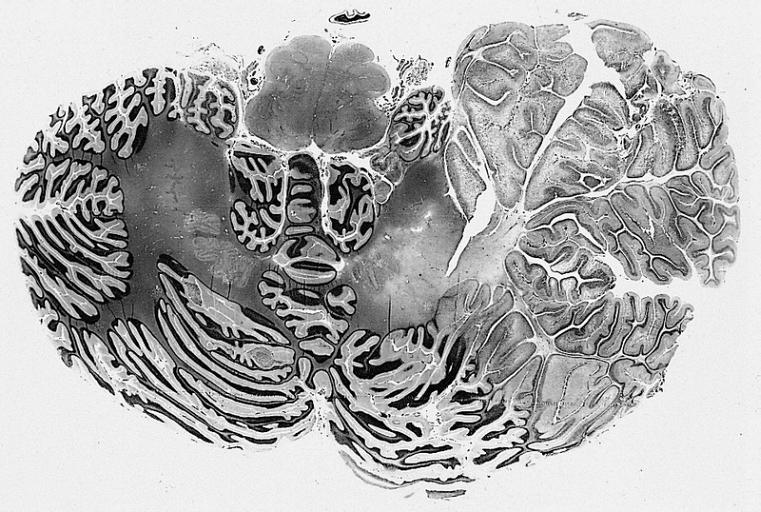Ganglioglioma
Editor-In-Chief: Prab R Tumpati, MD
Obesity, Sleep & Internal medicine
Founder, WikiMD Wellnesspedia &
W8MD medical weight loss NYC and sleep center NYC
| Ganglioglioma | |
|---|---|

| |
| Synonyms | N/A |
| Pronounce | N/A |
| Specialty | N/A |
| Symptoms | Seizures, headache, nausea, vomiting, neurological deficits |
| Complications | Increased intracranial pressure, hydrocephalus |
| Onset | Typically in children and young adults |
| Duration | Variable |
| Types | WHO grade I, WHO grade II |
| Causes | Unknown |
| Risks | Genetic predisposition |
| Diagnosis | MRI, CT scan, biopsy |
| Differential diagnosis | Astrocytoma, oligodendroglioma, dysembryoplastic neuroepithelial tumor |
| Prevention | N/A |
| Treatment | Surgical resection, radiotherapy, chemotherapy |
| Medication | N/A |
| Prognosis | Generally favorable with complete resection |
| Frequency | Rare |
| Deaths | N/A |
Ganglioglioma is a rare type of brain tumor that arises from a combination of neurons and glial cells. It is classified as a glioma, a type of tumor that originates from the glial cells in the brain or spine. Gangliogliomas are generally considered to be low-grade tumors, meaning they grow slowly and are less likely to spread to other parts of the body.
Epidemiology[edit | edit source]
Gangliogliomas account for approximately 1% of all primary brain tumors. They are most commonly diagnosed in children and young adults, with a peak incidence in the first three decades of life. Both males and females are equally affected by this type of tumor.
Pathophysiology[edit | edit source]
Gangliogliomas are composed of both neuronal and glial components. The neuronal component consists of ganglion cells, while the glial component is typically made up of astrocytes. These tumors often arise in the temporal lobe of the brain, which is associated with the control of seizures.
Clinical Presentation[edit | edit source]
The most common symptom of ganglioglioma is seizures, which occur in approximately 80% of patients. Other symptoms may include headache, nausea, vomiting, and neurological deficits depending on the tumor's location.
Diagnosis[edit | edit source]
The diagnosis of ganglioglioma typically involves a combination of neuroimaging techniques such as magnetic resonance imaging (MRI) and computed tomography (CT) scans. These imaging studies help to identify the location and extent of the tumor. A definitive diagnosis is made through a biopsy and subsequent histopathological examination, which reveals the characteristic mixed neuronal and glial cell composition.
Treatment[edit | edit source]
The primary treatment for ganglioglioma is surgical resection. The goal of surgery is to remove as much of the tumor as possible while preserving neurological function. In cases where the tumor cannot be completely resected, additional treatments such as radiation therapy or chemotherapy may be considered. However, these tumors are generally less responsive to these modalities compared to other types of brain tumors.
Prognosis[edit | edit source]
The prognosis for patients with ganglioglioma is generally favorable, especially for those who undergo complete surgical resection. The 5-year survival rate is high, and many patients experience long-term seizure control following surgery. However, the prognosis can vary depending on factors such as the tumor's location, size, and the extent of resection.
See Also[edit | edit source]
References[edit | edit source]
External Links[edit | edit source]
Transform your life with W8MD's budget GLP1 injections from $125
W8MD offers a medical weight loss program NYC and a clinic to lose weight in Philadelphia. Our W8MD's physician supervised medical weight loss centers in NYC provides expert medical guidance, and offers telemedicine options for convenience.
Why choose W8MD?
- Comprehensive care with FDA-approved weight loss medications including:
- loss injections in NYC both generic and brand names:
- weight loss medications including Phentermine, Qsymia, Diethylpropion etc.
- Accept most insurances for visits or discounted self pay cost.
- Generic weight loss injections starting from just $125.00 for the starting dose
- In person weight loss NYC and telemedicine medical weight loss options in New York city available
- Budget GLP1 weight loss injections in NYC starting from $125.00 biweekly with insurance!
Book Your Appointment
Start your NYC weight loss journey today at our NYC medical weight loss, and Philadelphia medical weight loss Call (718)946-5500 for NY and 215 676 2334 for PA
Search WikiMD
Ad.Tired of being Overweight? Try W8MD's NYC physician weight loss.
Semaglutide (Ozempic / Wegovy and Tirzepatide (Mounjaro / Zepbound) available. Call 718 946 5500.
Advertise on WikiMD
|
WikiMD's Wellness Encyclopedia |
| Let Food Be Thy Medicine Medicine Thy Food - Hippocrates |
Translate this page: - East Asian
中文,
日本,
한국어,
South Asian
हिन्दी,
தமிழ்,
తెలుగు,
Urdu,
ಕನ್ನಡ,
Southeast Asian
Indonesian,
Vietnamese,
Thai,
မြန်မာဘာသာ,
বাংলা
European
español,
Deutsch,
français,
Greek,
português do Brasil,
polski,
română,
русский,
Nederlands,
norsk,
svenska,
suomi,
Italian
Middle Eastern & African
عربى,
Turkish,
Persian,
Hebrew,
Afrikaans,
isiZulu,
Kiswahili,
Other
Bulgarian,
Hungarian,
Czech,
Swedish,
മലയാളം,
मराठी,
ਪੰਜਾਬੀ,
ગુજરાતી,
Portuguese,
Ukrainian
Medical Disclaimer: WikiMD is not a substitute for professional medical advice. The information on WikiMD is provided as an information resource only, may be incorrect, outdated or misleading, and is not to be used or relied on for any diagnostic or treatment purposes. Please consult your health care provider before making any healthcare decisions or for guidance about a specific medical condition. WikiMD expressly disclaims responsibility, and shall have no liability, for any damages, loss, injury, or liability whatsoever suffered as a result of your reliance on the information contained in this site. By visiting this site you agree to the foregoing terms and conditions, which may from time to time be changed or supplemented by WikiMD. If you do not agree to the foregoing terms and conditions, you should not enter or use this site. See full disclaimer.
Credits:Most images are courtesy of Wikimedia commons, and templates, categories Wikipedia, licensed under CC BY SA or similar.
Contributors: Prab R. Tumpati, MD



